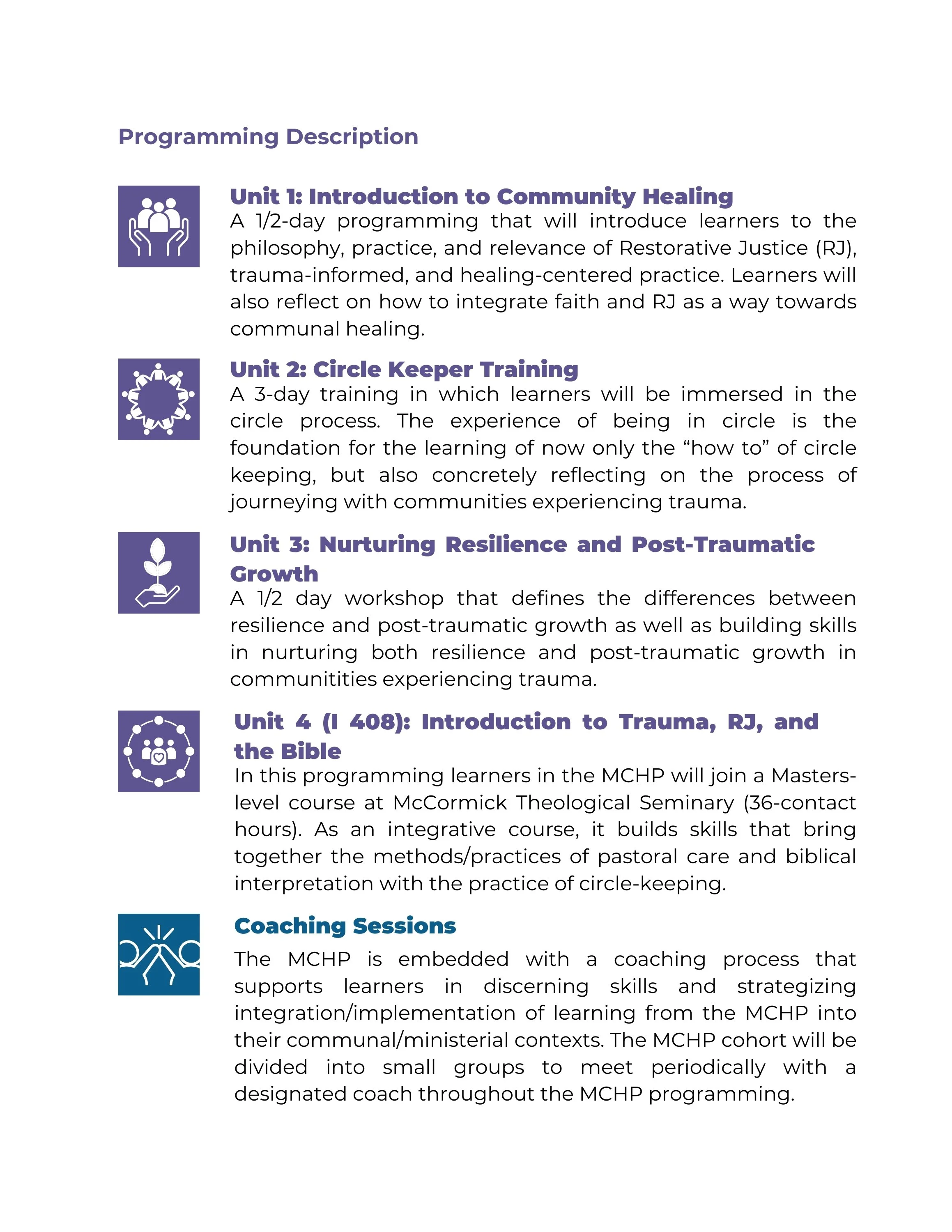McCormick’s Trauma Healing Initiative is focused on developing a model for creating a trauma-informed, healing -centered culture within theological education institutions. It also aims to deepen relationships with faith communities and community partners to provide them with resources that can help them respond to institutional, historical, collective, and personal trauma among their constituents.
Micro-Credential in
Community Healing Practices (MCHP)
The goal of the Trauma Healing Initiative Micro-Credential in Healing Practices (MCHP) at McCormick Theological Seminary is to equip faith leaders and community practitioners for trauma-informed and healing-centered practices. The MCHP program is built on a strength-based approach — without assumptions of prior theological/trauma training or familiarity with Restorative Justice practices. Teaching and learning are anchored in the following:
Restorative Justice (RJ) philosophy and methods that can create, hold, and sustain communities
Knowledge sharing and skill development in practices that nurture resilience and post-traumatic growth in community
Theological reflection on the challenges of trauma, healing and restoration
Executive coaching to support learners as they introduce and explore trauma-informed and healing-centered practice in their contexts
A UNIQUE LEARNING COMMUNITY
The MCHP brings learners together with faculty from the fields of pastoral care, practical theology, Bible, restorative justice practitioners, trauma specialists, and executive coaches to create the MCHP’s unique programming. We seek to gather a cohort with diverse experiences and a wide representation of communal experiences of trauma and commitments to healing.
The design of the MCHP programming is built on a strength-based approach — without assumptions of prior theological/trauma training or familiarity with Restorative Justice practices. The MCHP programming is designed to build baseline knowledge within the context of relationship building that is central to forming a learning community in trauma-informed and healing-centered ways.
We invite community practitioners, activists, organizers, clergy, lay leaders, and current seminary learners to form the first cohort of 20 participants for the Micro-Credential in Community Healing Practices for the 2024-2025 academic year.
MCHP 2025/2026 CALENDAR DATES
2025:
March 7 — Cohort 2: Applications Open
April 30 — Cohort 2: Applications Close
May 30 — Cohort 2: Accepted & Waitlist Notified
July 2 — Cohort 2: Applicant Acceptance & Fees Due
July 7 — Cohort 2: Waitlist Notified of Openings
July 16 — Cohort 2: Waitlist Payments Due
August 11 — Cohort 2: Notify Coaches and Learners of Groups
August 21 — Cohort 2: Coaches and Learners “Get To Know You” Session
September 27 — Intro to Community Healing Session
2026:
Jan 8-11 & 22-24 — Circle-Keeper Training, 9am - 4pm CST
February 18 — Cohort 3: Early Bird Information Session
March 4 — Cohort 3:Applications Open
April 29 — Cohort 3:Applications Close
May 16 — Cohort 2: Nurturing Resilience and Post-Traumatic Growth
July 7-9, 14-16, 21-23 — Cohort 2: I408 (M/B 408) Introduction to Trauma, RJ, and the Bible
MCHP PROGRAMMING
The programming units of the MCHP are designed as sequential building blocks in a cohort model of 20 participants. Programming units in the MCHP are intentionally designed to 1) develop basic knowledge, 2) experience of Restorative Justice practices, as well as 3) develop relationships amongst participants and facilitators.
Across 4 programming units, 7 coaching sessions are embedded into the MCHP to support learners in discerning skills and strategizing integration as well as implementation of learnings from the MCHP programming into their communal/ministerial contexts. The MCHP cohort will be divided into small groups or 3-4 to meet for seven 60-minute coaching with a designated coach across the programming units.
MODALITIES
THI MCHP programming units (Units 1-4) are offered in an In-Person modality. A hybrid attendance (via Zoom) will be available ONLY for our cohort members joining us from more than 60 miles of McCormick Theological Seminary, with the exceptions. Please refer to your welcome letter for details.
TUITION & FEES
COMMITMENT TO PARTICIPATION
In keeping with THI’s emphasis on community building, it is important that all participants fully participate in every cohort session from beginning to end and make the time and emotional commitment to engage in the life of the group. Late arrivals and/or early departures distract participants’ focus thereby detracting from the cohort experience. Out of respect for one another, and regard for our shared work, we ask for full participation by all members of any cohort.
While attendance at all programming sessions is required, we want to draw your attention in particular to the January Circle Keeper Training.
Circle Keeper Training runs January 8-11 or January 22-24 and the sessions typically begin at 9am and end by 4pm.
Chicagoland MCHP learners are required to attend in person.
MCHP cohort members outside of the Chicagoland can attend online, or in person if they choose. If you live outside of the Chicagoland area and wish to attend Circle Keeper Training in person, you will be responsible for your own travel and lodging arrangements.
Because Circle Keeper Training is such a pivotal moment in the MCHP, absence from the January Circle Keeper Training will unfortunately require that you discontinue the MCHP.
Every effort will be made to ensure that participants’ experience will be enriching, engaging and unencumbered. If conflicting plans, family obligations, or unforeseen events inhibit your full participation, you may need to withdraw from the cohort. It is expected that if you agree to participate in the MCHP that you will abide by this statement. Should extenuating circumstances arise, please immediately contact us using button below.
If you have any questions about the admissions process or to learn more about McCormick Theological Seminary,
please contact Rev. Dr. Leslie Díaz-Pérez, Sr. Director of Enrollment.








